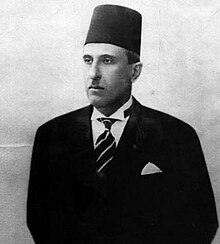Shukri al-Quwatli
| Shukri al-Quwatli شكري القوتلي |
|
|---|---|
 |
|
| President of Syria | |
|
In office 17 August 1943 – 30 May 1949 |
|
| Preceded by | 'Ata al-Ayyubi |
| Succeeded by | Husni al-Za'im (Military Rule) |
|
In office 6 September 1955 – 22 February 1958 |
|
| Preceded by | Hashim al-Atassi |
| Succeeded by | Gamal Abdel Nasser (United Arab Republic) |
| Personal details | |
| Born | 1891 Damascus, Syria |
| Died | 30 June 1967 (age 76) Beirut, Lebanon |
| Political party |
National Bloc (until 1947) National Party (from 1947) |
| Religion | Sunni Islam |
Shukri al-Quwatli (1891 – 30 June 1967; Arabic: شكري القوتلي) was the first president of post-independence Syria. He began his career as a dissident working towards the independence and unity of the Ottoman Empire's Arab territories and was consequently imprisoned and tortured for his activism. When the Kingdom of Syria was established, Quwatli became a government official, though he was disillusioned with monarchism and co-founded the republican Independence Party. Quwatli was immediately sentenced to death by the French who took control over Syria in 1920. Afterward, he based himself in Cairo where he served as the chief ambassador of the Syrian-Palestinian Congress, cultivating particularly strong ties with Saudi Arabia. He used these connections to help finance the Great Syrian Revolt (1925–1927). In 1930, the French authorities pardoned Quwatli and thereafter, he returned to Syria, where he gradually became a principal leader of the National Bloc. He was elected president of Syria in 1943 and oversaw the country's independence three years later.
Quwatli was reelected in 1948, but was toppled in a military coup in 1949. He subsequently went into exile in Egypt, returning to Syria in 1955 to participate in the presidential election, which he won. A conservative presiding over an increasingly leftist-dominated government, Quwatli officially adopted neutralism amid the Cold War. After his request for aid from the United States was denied, he drew closer to the Eastern bloc. He also entered Syria into a defense arrangement with Egypt and Saudi Arabia to confront the influence of the Baghdad Pact. In 1957, Quwatli, who the US and the Pact countries attempted but failed to oust, sought to stem the leftist tide in Syria, but to no avail. By then, his political authority had receded as the military bypassed Quwatli's jurisdiction by independently coordinating with Quwatli's erstwhile ally, Egyptian president Gamal Abdel Nasser.
...
Wikipedia
